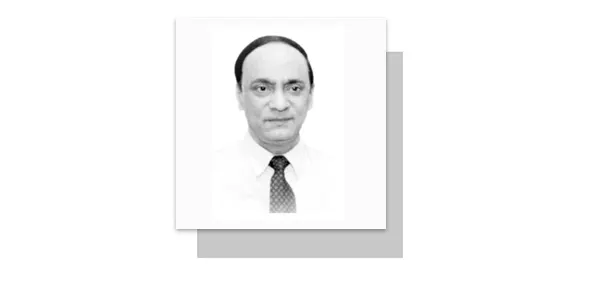AT a presser held after the Central Executive Committee (CEC) meeting of the party held on February 13 the Chairman Pakistan People’s Party (PPP) Bilawal Bhutto categorically stated that his party will extend full support to PML-N in forming the government at the Centre. In the same breath, Bilawal also categorically stated that his party will not join the cabinet. On the contrary, PPP co-chairman and former President, Asif Ali Zardari, speaking at a presser held at the residence of the PML-Q President, Chaudhry Shujat Hussain on February 13 cogently said, “We have decided today that we will get together and form the government to lift Pakistan from difficulty.” The referenced presser was participated by PML-N President Mian Shehbaz Sharif, member of Balochistan Awami Party (BAP) and incumbent Chairman Senate Sadiq Sanjrani, MQM-P Convener Dr. Khalid Maqbool Siddiqui and Istehkam-e-Pakistan Party (IPP) leader Abdul Aleem Khan. The Jamiat Ulema-e-Islam (JUI) chief Maulana Fazlur Rehman was conspicuous by his absence at the news conference. None of the leaders present on the occasion could provide a tangible reason for his absence.
Though vague, one has to admit that the stance of Co-chairman PPP Asif Ali Zardari was a little different from the party’s chairman Bilawal Bhutto Zardari. While Bilawal Bhutto has been utterly blunt in venting his views on the issue of PPP’s role in the coalition government in the making, Co-chairman Asif Ali Zardari was comparatively subtle and diplomatic. This compels one to conclude that basically both are on the same page. When co-chairman PPP, Asif Ali Zardari makes a vague statement, “We have decided today that ‘we will get together’ and form the government to lift Pakistan from difficulty,” it is evident that he, like party chairman Bilawal Bhutto, clearly means that PPP will support PML-N in the formation of the government but will not be a part of the cabinet and will sit in the opposition.
Should this move of Chairman PPP, Bilawal Bhutto and Co-chairman Asif Zardari be termed as smart? Yes, it should. By making this smart move, the PPP has played it safe. It has astutely manoeuvred the situation in its favour. But such moves, one has to admit, are absolutely contrary to what the country badly needs today. It is known to all and sundry, Pakistan is passing through the most critical period in its history. What Pakistan direly needs today is political stability, so as to be able to steer itself out of its gargantuan socio-economic and political predicaments.
The Chairman PPP Bilawal Bhutto appreciates that the country is confronting an unparalleled crisis, and also asserts his party’s principal decision to take Pakistan out of the current crisis, but at the same time he is not prepared to take equal responsibility and be an integral part of the cabinet of the coalition government. He says his party will sit in the opposition, and will support the government on issue to issue basis. Isn’t all this a little too confusing? How can one sit in the opposition and at the same time outrightly support the policies and plans of the government in the saddle? This is something beyond one’s stretch of imagination to understand.
Bilawal Bhutto says that he wants to see his father as the President of Pakistan. Why not? Co-chairman PPP Asif Ali Zardari has been the President of Pakistan, once before. During his 5-year stint as the President, he outstandingly represented Pakistan at the highest level at all international forums. One doesn’t see any reason why he cannot or should not be elected as the President of the country, once again. Bilawal is also aspiring to see his party’s candidates at the helm in the Senate and National Assembly of Pakistan. No one should have any reservations vis-à-vis Bilawal’s aspirations. But one certainly has the right to ask, what is it that is holding PPP from being an active part of the coalition government?
The Jamiat Ulema-e-Islam (JUI) chief Maulana Fazlur Rehman who was conspicuous by his absence at the presser jointly held on February 13, finally broke his silence on February 14. At a presser held in Islamabad on February 14 he categorically said, “We are not aligned with any political party, including PML-N.” He further said, “We will not endorse Shehbaz Sharif as the prime ministerial candidate in Parliament, as our party has prohibited him from forming the government.”
What does the prevailing scenario in the political arena of the country reflect? It, for sure, does not reflect optimism. It speaks volumes about the threat of social unrest brewing up to confront the country in the days to come. It appears that the political forces have become totally oblivious of the gigantic economic predicaments that Pakistan faces today. They don’t seem to have learnt any lesson from the past. How very sad, after having spent billions of tax payers’ money (over Rs.17 billion as reported in the media) on the recently-held national elections, we are back to square one.
The looming political crisis cannot, repeat cannot be amicably resolved by the political forces by themselves. History bears testimony to the fact, they have not been able to do so in the past, and they would not be able to do it now. One is compelled by circumstances to say that time has come for those who possess the capacity to exercise its influence on the political forces of the country to act briskly and bring them together on one platform in the larger interest of this country. If this is not done, one clearly sees burgeoning political instability and chaos in the country.
—The writer is a columnist and analyst based in Islamabad-Pakistan.
Email: [email protected]
views expressed are writer’s own.










